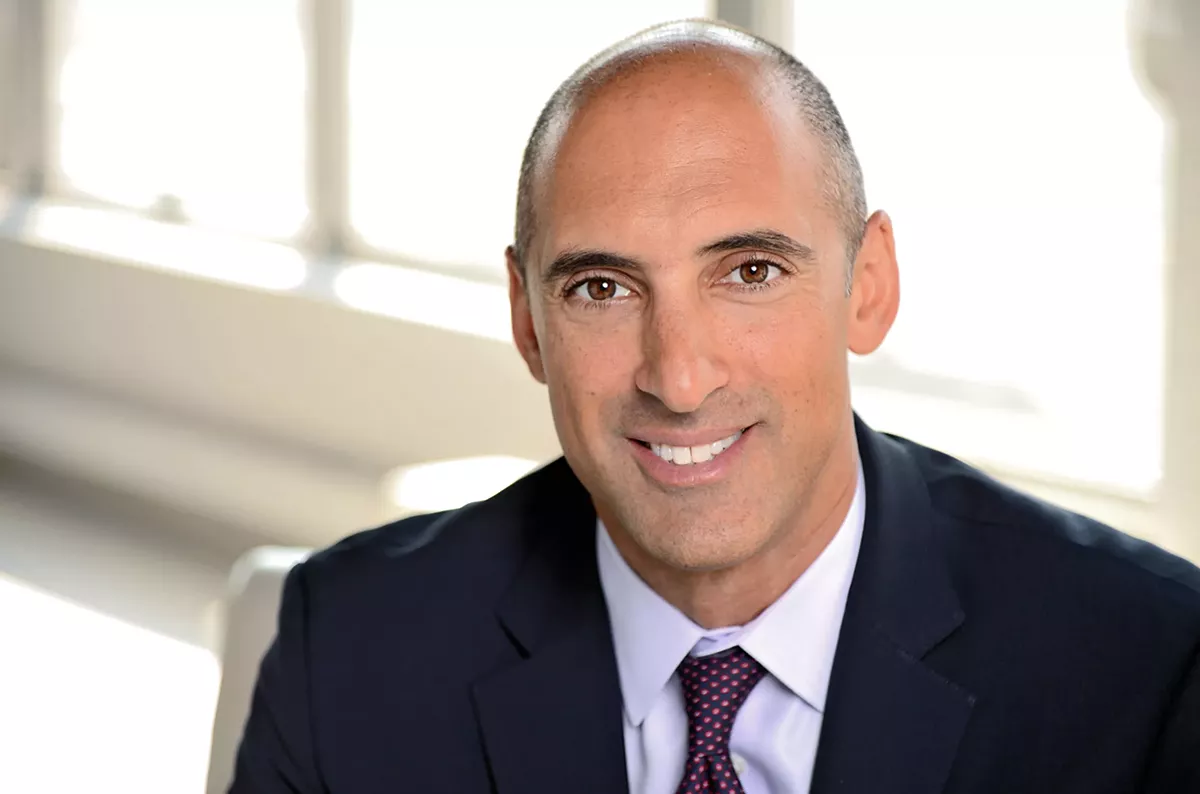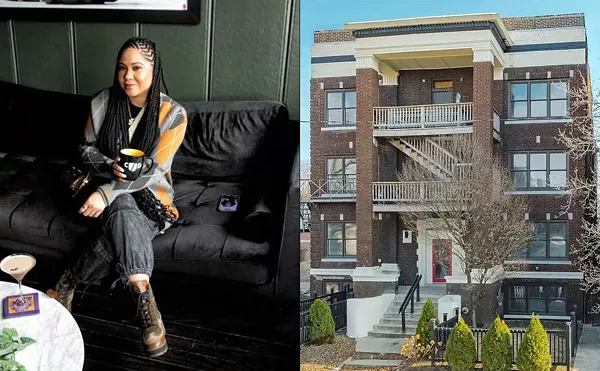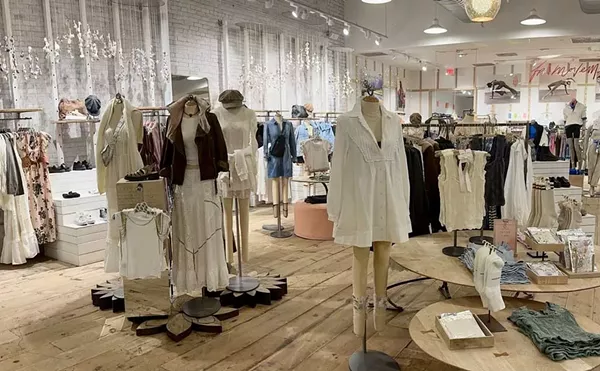

Audio By Carbonatix
[
{
"name": "GPT - Leaderboard - Inline - Content",
"component": "35519556",
"insertPoint": "5th",
"startingPoint": "3",
"requiredCountToDisplay": "3",
"maxInsertions": 100,
"adList": [
{
"adPreset": "LeaderboardInline"
}
]
}
]
Despite all of the streaming services now at our fingertips — Disney+, Apple TV+, HBO Max, NBC's Peacock, and Quibi all launched this year, joining giants like Netflix, Hulu, Amazon Prime, YouTube Premium, and others — for viewers with a thirst for local programming, sometimes it can all feel a bit like "The Rime of the Ancient Mariner": "Water, water everywhere, nor any drop to drink."
With a new app called Locast, attorney David Goodfriend is trying to change that.
Billed as a way to watch broadcast TV over the internet, Locast entered the Detroit market earlier this month, giving 4.5 million viewers in nine counties in Southeast Michigan a way to watch more than 60 locally broadcast television channels — including ABC, CBS, Fox, NBC, The CW, and PBS — for free, without an antenna or pricey cable or satellite TV bundle.
Programs on these channels are among the most popular and widely watched, and for years, anyone could watch them with a good old-fashioned pair of "rabbit ears" on top of their TV set. But the technology is still not accessible to everyone.
"Maybe somebody living in downtown Detroit has a hard time getting a signal because the building next door is blocking it," Goodfriend says. "Or maybe there's somebody out in rural Michigan, who's still in the Detroit market but lives too far away from the transmission tower to get it for whatever reason. There are lots of people who cannot get free TV broadcast over the air. And that's where we come in."
Even many tech-savvy viewers are ditching antennas and cutting their cable cords for a more streamlined, app-based à la carte viewing experience. Locast is available to anyone with an internet connection as a downloadable app, and streams the content unaltered, interrupting with a brief house ad every 15 minutes asking for an optional donation of $5 a month. (Much like the music-streaming service Spotify, paying the monthly fee makes the house ads go away.)
Locast also represents a shift in how we think about broadcast programming — or as Goodfriend sees it, a return to how we used to think about it. At one time, broadcast television was thought of as something more akin to a public utility than a commercial service. Under federal law, stations got to use the airwaves for free to broadcast their signals, but they had to make their programming available for free to the public to watch. Since it was viewed as a public good, the government imposed a number of rules on the broadcasters, calling for a certain amount of locally oriented coverage, children's programming, and a balance of political viewpoints, among others.
Then, in 2000, broadcasters won a long legal battle that required cable and satellite companies to pay hefty "retransmission consent" fees to carry those signals, representing about $12 added to the average consumer's cable bill. However, Goodfriend realized there are a number of loopholes in the law. For one, the Copyright Act of 1976 doesn't specify that the broadcast has to occur over the airwaves. So a bit more than a decade ago, Goodfriend says he got an idea: What if they could be broadcast over the internet?
In 2012, another start-up called Aereo attempted to do the same thing, but charged its viewers a fee, without paying anything to the broadcasters — who swiftly banded together to successfully sue Aereo, which soon declared bankruptcy. But Goodfriend saw another loophole: The law allows transmission of broadcast stations for free as long as it's made "without any purpose of direct or indirect commercial advantage" by a "governmental body, or other nonprofit organization."
Goodfriend had a nonprofit. After graduating from college in Wisconsin, he moved to D.C., where he served as a Clinton administration aide, and later, worked for the Federal Communications Commission and later became a top executive at Dish Network. About 12 years ago, he started his own law lobbying practice with an aim to help what he felt was an underserved constituency, at least when it came to public policy: consumers, or more specifically, sports fans. In 2009, he started a nonprofit called Sports Fans Coalition.
"I believed that fans were getting screwed," Goodfriend says. "Federal, state, and local policy was being made without the fans really being represented. And I thought, 'This is going to be my opportunity to make a difference in consumer advocacy.'"
With Sports Fans Coalition, Goodfriend took on no less than the NFL, taking aim at the so-called "blackout rule," which dates back to a time when the league prohibited its games from being broadcast on TV, believing it would hurt ticket sales at their stadiums. Goodfriend calls the rule "greedy," pointing out that the vast majority of professional American sports stadiums were built with some form of taxpayer money, anyway. "Which means we have a right, goddammit, to watch the games that are being played there!" he says. "Our taxpayer dollars built the place!"
Goodfriend won: After a legal battle, the FCC voted unanimously in 2014 to end the sports blackout rule. (And with sports games now playing in empty stadiums due to the pandemic, Goodfriend feels especially vindicated. "The sky did not fall," he says. "The NFL did not go bankrupt.")
With Locast, "it's the same idea," he says. "You cannot take public resources and turn around and deprive the public of access."
Goodfriend launched Locast in 2018 in New York City, practically goading the big networks to come after him in a New York Times story the next year. (Headline: "Locast, a Free App Streaming Network TV, Would Love to Get Sued.") A year and a half after launching, Goodfriend got his wish, with the networks joining forces to sue not only Locast but also Goodfriend personally, alleging, among other things, that Locast is not a nonprofit. "I don't make a fucking dime off this thing," Goodfriend says. "If anything, I've lost money for all the time I've put in this." Goodfriend says he handed over all his financial documents as part of the discovery phase of the lawsuit to prove it.
"They're trying to scare me into submission," he says. "So we did what everybody should do when confronted with a bully who's trying to intimidate you — we hit them back." Locast countered with a lawsuit of its own, alleging the networks violated antitrust laws by colluding with one another in order to undermine a competitor.
Goodfriend is confident that the law is on his side. "If you think back to why Congress would do this in the first place — why, in 1976, they would say a nonprofit can retransmit a broadcast signal — it probably was because the whole idea is to have local broadcast be as widely available as possible," he says. "This is the kind of social contract at the heart of our nation's broadcasting system — that we, the people, give these incredibly valuable licenses to companies in exchange for them providing locally oriented free broadcast TV."
But that social contract, Goodfriend says, "has really broken down over the years to where today, you've got to subscribe to cable, you've got to subscribe to satellite, you've got to pay somebody else. There's a lot of payment going on — and precisely the time that people are hurting economically in places like Detroit."
Goodfriend says he received a letter of gratitude from a low-income homebound and handicapped 80-year-old man who lives alone near an airport, which blocks antenna service; the man says he is happy to pay the optional $5 a month for Locast. Another Locast viewer wrote, saying that the service saved their life because they were able to access it on their phone while taking shelter from a tornado.
"That's what we're all about," Goodfriend says. "And the fact that some of the largest media corporations in the world would not only sue Locast, but sue me personally, to try to shut that down — now I'm pissed off!"
On that front, things are certain to get interesting, with Goodfriend calling for the case to go before a jury, and the San Francisco-based nonprofit the Electronic Frontier Foundation joining Locast's legal team pro bono.
In the meantime, Locast is joining more and more markets across the country, with Detroit being the latest. The service is now available in 17 out of 20 of the biggest media markets in the U.S., whose viewers represent 43% of the U.S. population. Locast has more than 1.5 million users, and enough of them have decided to pay $5 a month, allowing Goodfriend to pay Locast's bills, along with a high-interest rate loan he took to launch it.
You just need an email address to join Locast. The app is available from Apple, Android, Roku, Amazon Firestick, DirectTV, and even just through any web browser at locast.org. Once logged on, you see a grid of all the available TV channels, just like you would see on a TV provider. As an added bonus, Locast offers additional local programming that doesn't make it to cable: In a city like Detroit, Goodfriend says, that includes lots of non-English programming.
"Detroit is a great broadcast market and it's partly because of the variety of stuff that's on the air, reflecting the variety of communities in the city," Goodfriend says.
More importantly, Locast offers viewers a chance to stream local news at a time when journalism is "under siege," as Goodfriend says — partially because so many newspaper readers and advertisers have decided to stop paying for it, causing "news deserts" to open up across vast swaths of the country.
"There are newspapers going out of business, reporters being laid off," he says. "I really view our central mission as connecting people in the community to the news in a community."
Stay on top of Detroit news and views. Sign up for our weekly issue newsletter delivered each Wednesday.






